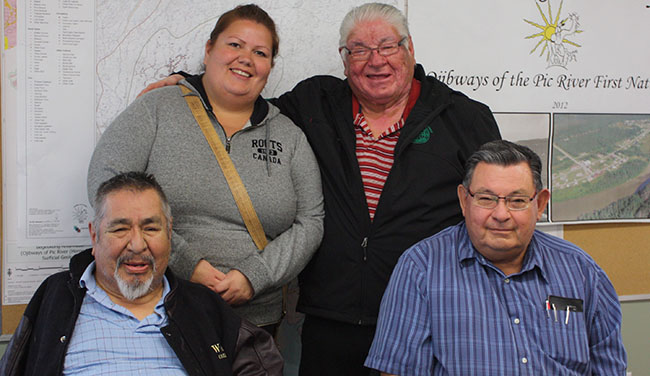Biigtgong Nishnaabeg (Pic River) ratifies their Gchi-Naaknigwein (constitution)

By Rick Garrick
Biigtgong Nishnaabeg (Pic River) citizens have ratified the Biigtigong Nishnaabeg Gchi-Naaknigewin constitution with 65 per cent voting in support during the Sept. 26 ratification vote.
“This is where the big work starts,” says Arnold Michano, a member of the Biigtigong Nishnaabeg Gchi-Naaknigewin Working Group. “We have many issues. Each one of them we’ll have to work on one by one with the community. The grassroots people are the ones who are going to have the final say. We’ll ratify each one of them, whether it is the election code, membership code, education code.”
Michano estimates it will take about five to 10 years to develop the different codes required by the community.
“Right now we are governed by the Indian Act on everything we do,” says Art Fisher, another member of the Biigtigong Nishnaabeg Gchi-Naaknigewin Working Group. “But with this constitution, it gives us permission to go ahead and make our own laws. Each one of these changes we make will have to be ratified by the people.”
Two-hundred and seventeen citizens cast a vote during the ratification process, with 141 citizens voting for the constitution and 72 voting against the constitution. Biigtgong Nishnaabeg has about 1,200 citizens, with about 500 living on the reserve, which is located about 352 kilometres northeast of Thunder Bay on Highway 627. Biigtgong Nishnaabeg developed the constitution over the past several years after first attending Union of Ontario Indians constitution development workshops in Sault Ste. Marie in 2006.
“It is the building foundation of how we are going to govern ourselves as a community in the future,” says Erin Shaw, another member of the Biigtigong Nishnaabeg Gchi-Naaknigewin Working Group. “This is just a huge step in a long process. We don’t list any laws in our constitution — those are what is going to be developed in the future.”
Herb Nabigon, another member of the Biigtigong Nishnaabeg Gchi-Naaknigewin Working Group, says the community now has jurisdiction under the constitution.
“Previous to that we didn’t have jurisdiction so we couldn’t even write a dog bylaw, for example — it wouldn’t be recognized in a court,” Nabigon says. “But with this constitution, we have jurisdiction. The way I look at it, there’s three orders of government in Canada now: there’s the federal government, there’s the provincial government and finally ours, Gchi-Naaknigewin. This (new) order of government gives us a strong authority to enact laws that relate directly to our community.”
Michano says the community reaction was negative when the constitution was first proposed, but the community changed their opinion as they were informed about the constitution’s advantages.
“We had to go from family to family … to explain this document to them,” Michano says. “It really turned their minds around to being more positive to it.”
Fisher says the constitution will provide the community with their own laws in the future.
“The Indian Act won’t be covering us anymore,” Fisher says. “We will be way further ahead because we will be able to run our own business on the reserve, we will be able to say how we want to do our lands and resources. The big part of it is we are going to be a government independent of the provincial and federal governments to run our community.”
Michano looks forward to working with resource development companies on future projects in the community’s traditional territory.
“We will have the final say on it,” Michano says. “We will do an agreement on revenue sharing with them; that is how we are going to generate our revenue.”
Michano says the community is also looking at developing three or four new hydro power projects in the area as well. The community already owns or is partners in three run of the river hydro power facilities.
“We’re looking at wind power, solar power and even tourism down the road,” Michano says. “So it is really exciting to go through this (constitution) process rather than depending on the Indian Act.”


